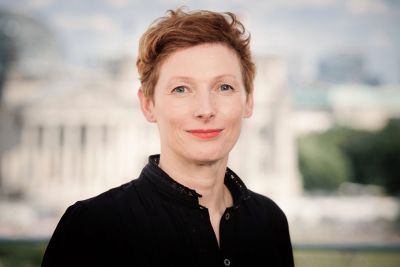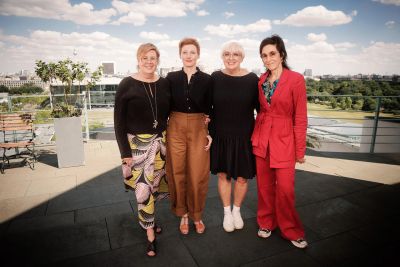Katarzyna Wielga-Skolimowska – Artistic Director of the German Federal Cultural Foundation

For many people, the appointment of Katarzyna Wielga-Skolimowska to the post of Artistic Director of the German Federal Cultural Foundation came as a surprise. However, anyone who has followed her achievements in the cultural sector in recent years will be aware of her wide range of skills. Claudia Roth, the Federal Government Commissioner for Culture and the Media, made particular mention of this in her press release in mid-2022, in which she announced the unanimous vote in favour of Katarzyna Wielga-Skolimowska as Artistic Director of the Cultural Foundation: “With Katarzyna Wielga-Skolimowska, the German Federal Cultural Foundation now has a culture manager on board with international experience and high-level curatorial skills.”[1] Roth added that Wielga-Skolimowska had “impressed the selection committee with her broad knowledge of cultural production in a very wide range of cultural spaces and sectors.”[2] She continued that she had demonstrated a “deeply rooted, empathetic affection for the artists involved”.[3]
Wielga-Skolimowska took over the role from Hortensia Völckers, who had headed the German Federal Cultural Foundation for 20 years since its inception in 2002, and who is considered to be one of the most influential players in the German cultural scene. Over its two decades of existence, the German Federal Cultural Foundation, which is based in Halle, has funded 4,000 projects. Its annual budget of around 40 million Euros is provided by the Federal Government Commissioner for Culture and the Media. The institutions and activities funded by the Foundation include the most important cultural events in the country, such as the Berlin Biennale, the Berliner Theatertreffen, the Transmediale, and the Ensemble Modern. The Foundation employs around 60 staff.
For curator Katarzyna Wielga-Skolimowska, Germany is just one stop along her career path – though it has been the longest so far. She was born in Warsaw in 1976, and took a degree in theatre studies, first in Warsaw and then in Berlin. After graduating, she worked at the Adam Mickiewicz Institute (Instytut Adama Mickiewicza), whose mission is to raise awareness of Polish culture throughout the world and to promote collaboration with international institutions.
One important project at that time was the “Polish Year” in Israel (2008–2009), which coincided with the celebrations to mark the 60th anniversary of the creation of the State of Israel. Wielga-Skolimowska moved to Israel for three years to build bridges between Polish and Israeli artists and cultural institutions. Looking back, she regards her work during this period as an important stage in her professional career. “I believe that my strength is bringing people together and then [...] seeing where their own strengths lie and how they can be used productively”[4], she explained in an interview for the rbb radio3 podcast. She was particularly successful at bringing artists together through study trips for groups and individuals. In total, there were 180 study trips during the Polish Year in Israel. In some cases, the artists who took part have remained in contact to this day.
After returning from Israel, Wielga-Skolimowska worked for the National Audiovisual Institute (today: Filmoteka Narodowa – Instytut Audiowizualny). In 2011, she was responsible for the cultural programme of the Polish EU Council presidency: “Art for Social Change – sztuka dla zmiany społecznej”. According to the abstract on the culture.pl portal, the aim of the programme was to inspire artists and the general public to “adopt a creative stance which increases artistic and social awareness and inspires critical reflection on culture and civilisation.”[5]
In 2013, Katarzyna Wielga-Skolimowka beat the competition to become head of the Polish Institute in Berlin. She remained in this post for three years. As during the Polish Year in Israel, she did not limit her activities to presenting Polish culture in large-scale individual events, instead seeking contact with local artists as well as promoting smaller-scale initiatives. In 2016, the surprise decision by the Polish Ministry of Foreign Affairs to remove the head of the Berlin branch from office with immediate effect caused a great deal of consternation in the culture scene. There was speculation in the media that Wielga-Skoliowska’s refusal to organise a screening of the film “Smoleńsk” in Berlin had led to her downfall. Others suggested that Wielga-Skolimowska had focused too strongly on Jewish topics. She herself refrained from commenting on what had happened, not least since she was officially still an employee of the Ministry.
The German cultural institutions that collaborated with the Polish Institute in Berlin were horrified by the decision to remove Katarzyna Wielga-Skolimowska from office. In December 2016, around a dozen representatives of the cultural scene wrote to the Ambassador of the Republic of Poland in Germany, Andrzej Przyłębski, and to Foreign Minister Witold Waszczykowski, expressing their “shock and incomprehension”[6] over her dismissal. Their statement read as follows: “Ms Wielga-Skolimowka has succeeded, through joint projects with a historical and cultural focus, in fostering a greater appreciation of contemporary Poland; it is thanks to her commitment and outstanding work that the people of Berlin have become aware of Polish culture. You will not find a better advocate for Poland”.[7]
After her dismissal, Katarzyna Wielga-Skolimowska spent a period of time working for the German Federal Agency for Civic Education (Bundeszentrale für politische Bildung), before moving to Riyadh, the capital of Saudi Arabia, in 2020 to open a branch of the Goethe Institute there. As she said in an interview for the radio3 podcast, when asked about her memories from her time in the city: “The biggest challenge was to change my attitudes. To cast stereotypes aside. [...] It is a patriarchal society, although you can say that in essence, Poland is also a patriarchal society, one in which women are extremely strong”[8].
As well as her wide-ranging skills and extensive experience gained in Germany and the Middle East, a further factor in selecting her for the post of Artistic Director of the German Federal Cultural Foundation was her eastern European perspective. She herself emphasised that in Germany, there are many reasons to re-examine issues with which we have already been confronted in the past. In an interview with the Berlin newspaper “Tagesspiegel”, she said: “We need to return to the old topics and questions relating to eastern Europe once again. What does the East mean; what is eastern European history?”[9] She also referred to the fact that a lot has happened since the eastward expansion of the EU in 2004, but the sense of optimism that dominated at that time has now been replaced by fear.
Wielga-Skolimowska has clear views when it comes to the discussion surrounding the rise in right-wing populism and antisemitism in the culture scene: “Culture must be able to tackle political themes without there being immediate consequences. That is its independence. Culture must have a space without constraints and demands placed on the artists.”[10] Art must be free, she says. It can also provoke and generate strong emotions. “Its contribution to democracy must not be idealised. Art can counter antisemitism, but let’s be honest: it can also promote it.”[11]
Monika Stefanek, May 2024




